How Much Does It Cost to Remodel a Small Bathroom?
Remodeling a bathroom can breathe new life into your home while increasing its value. However, it’s essential to understand the costs involved in a small bathroom remodel. The expense can vary based on several factors such as material choices, labor costs, and design preferences.
In this section, we’ll explore the costs associated with small bathroom remodeling so that you can make informed decisions about your project.
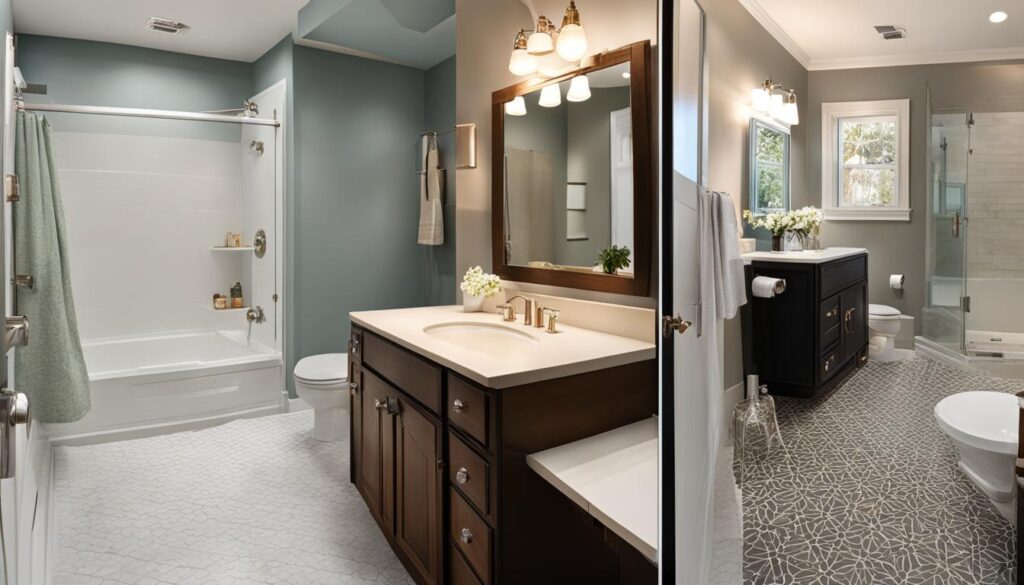
Key Takeaways:
- A small bathroom remodel can vary in cost based on several factors.
- Factors such as material choices, labor costs, and design preferences can all impact the overall expense.
- Understanding the costs associated with small bathroom remodeling can help you make informed decisions about your project.
Factors Affecting Bathroom Remodeling Costs
When it comes to bathroom remodeling costs, there are various factors to consider. By understanding the various factors that influence the cost, you can make informed decisions that align with your budget.
- The size of the bathroom: Generally, the larger the bathroom, the higher the cost. Larger bathrooms require more materials and typically take longer to remodel, resulting in higher labor costs.
- Desired upgrades: The specific improvements you want to make to your bathroom will heavily influence the cost. Upgrading to high-end fixtures and finishes, for example, will be more expensive than choosing more economical options.
- Regional differences: Labor and materials costs can vary significantly by location. For example, a bathroom remodel in a major metropolitan area is typically more expensive than one in a smaller town or rural area.
Bathroom Remodeling Cost Estimates
According to HomeAdvisor, the average cost of a bathroom remodel ranges from $6,000 to $15,000. However, costs can easily exceed $20,000 for high-end renovations or more significant changes. Here’s a breakdown of the average costs for different aspects of a bathroom remodel:
| Aspect of Remodel | Average Cost |
|---|---|
| New flooring | $800 – $2,000 |
| Vanity replacement | $500 – $3,000 |
| Countertop replacement | $900 – $5,000 |
| Shower or tub installation | $1,000 – $4,700 |
| New lighting installation | $100 – $800 |
| New toilet installation | $130 – $780 |
| Fixtures installation | $150 – $900 |
| New paint job | $350 – $1,000 |
Keep in mind that these estimates are just that – estimates. Your specific project may fall above or below these figures depending on the factors we’ve discussed.
Get an Accurate Bathroom Renovation Estimate
Given the many variables involved in a bathroom remodel, getting an accurate estimate is crucial. It’s best to consult with professionals who can evaluate your specific project and provide a more precise estimate.
When looking for contractors, be sure to do your research and get quotes from multiple sources. This will give you a broader sense of expected costs and help you identify any outliers or red flags.
Estimating Material Costs for Small Bathroom Remodels
When planning a small bathroom remodel, material costs can play a significant role in determining the overall expenses. Careful consideration should be given to the cost of each type of material to ensure that the remodel is completed within the planned budget. Below is a closer look at the costs of some of the most common materials in a bathroom remodel project:
| Material | Average Cost |
|---|---|
| Bathroom Fixtures | $300-$1,500 |
| Tiles | $1-$20 per square foot |
| Countertops | $30-$1,000 per square foot |
| Flooring | $3-$15 per square foot |
| Storage Solutions | $50-$200 per piece |
While using high-end materials can improve the aesthetic appeal of a small bathroom, it comes with a higher price tag. However, there are ways to make cost-effective decisions without sacrificing quality. For instance, opting for porcelain tiles instead of natural stone ones can significantly reduce the cost of tiles while still providing a sleek and modern look.
Another tip is to repurpose or refinish existing materials where possible. This can include painting or staining cabinets and replacing hardware instead of purchasing entirely new storage solutions.
To estimate the overall cost of materials for a small bathroom remodel, consider all the necessary upgrades and their materials. Add up their individual costs, and use that figure to inform the overall budget of the project.
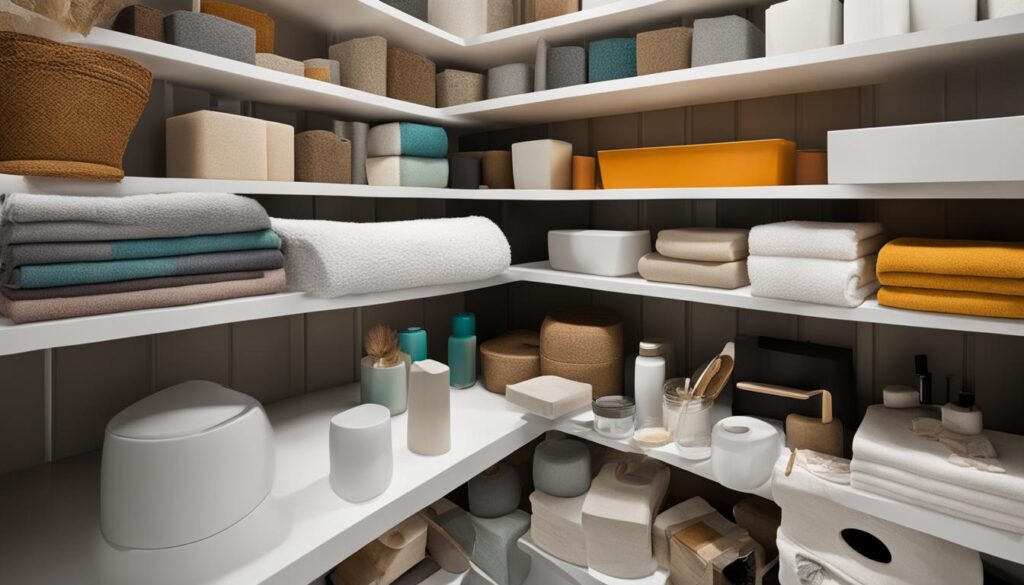
Emphasizing Quality Over Quantity
While searching for affordable options is crucial, it is equally important not to compromise quality over quantity. Choosing low-quality materials may cause them to wear out faster or require repairs and replacement more frequently, ultimately increasing the overall expenses of the project in the long run.
Tip: Opting for materials with good quality and durability can reduce long-term maintenance and replacement costs, offsetting the initial upfront expenses caused by choosing higher-end materials.
It is also important to note that the costs of materials can vary depending on the supplier and location. Therefore, it’s essential to shop around and compare prices to find the best deals.
Labor Costs for Small Bathroom Remodeling
Labor expenses can account for a significant portion of your small bathroom remodeling costs. Various professionals may be involved in your project, and the complexity of the remodel can also affect the overall expense.
The average labor costs for small bathroom remodels can range from $1,500 to $15,000. Plumbers, electricians, carpenters, and general contractors are among the professionals you may need to hire. The following table outlines the average hourly rates for these professionals.
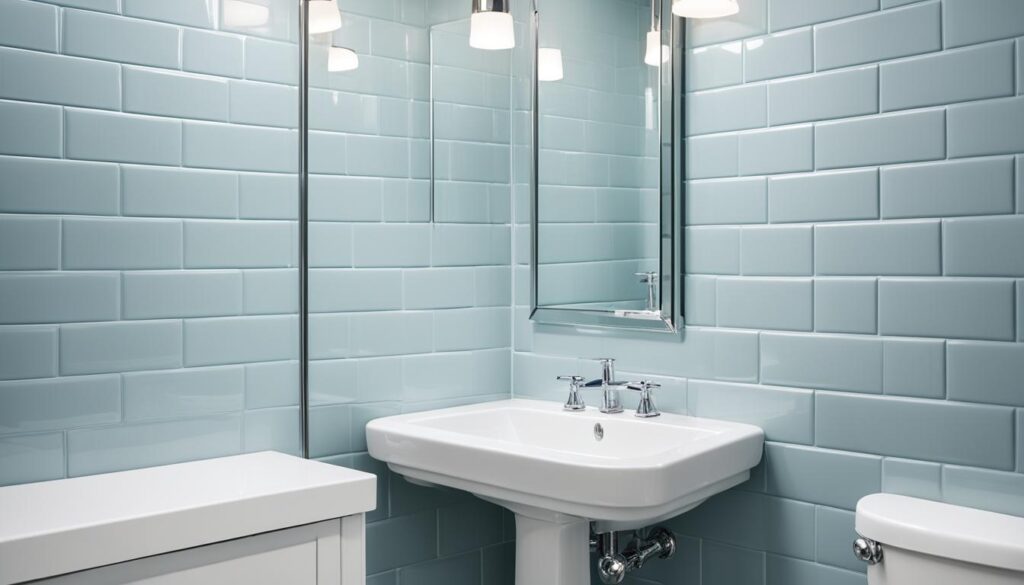
| Professional | Average Hourly Rate |
|---|---|
| Plumber | $45 – $200 |
| Electrician | $50 – $100 |
| Carpenter | $35 – $100 |
| General Contractor | $50 – $220 |
When it comes to labor costs, location can also play a significant role. Labor rates tend to be higher in urban areas compared to rural regions. However, keep in mind that hiring professionals in your local area can often save you money on transportation and travel expenses.
While labor costs can be a significant expense, hiring professionals can ensure that your small bathroom remodel is completed efficiently and to a high standard.
Design Choices and Their Impact on Bathroom Remodel Costs
When planning a small bathroom remodel, the design choices you make can significantly impact the overall cost. From fixtures to color schemes, every design element should be evaluated carefully to ensure you achieve your desired aesthetic without exceeding your budget.
Fixtures: Upgrading bathroom fixtures, such as a sink, toilet, or showerhead, can add up quickly. However, opting for higher-end fixtures can also increase the resale value of your home. When selecting fixtures, consider durability and functionality, as well as aesthetic appeal.
Lighting: Lighting is an often-overlooked aspect, but it can have a dramatic impact on the look and feel of your bathroom. Natural light, recessed lighting, and vanity lighting are popular options. Remember, more expensive lighting fixtures can increase the overall cost, but can also contribute to your bathroom’s overall ambiance.
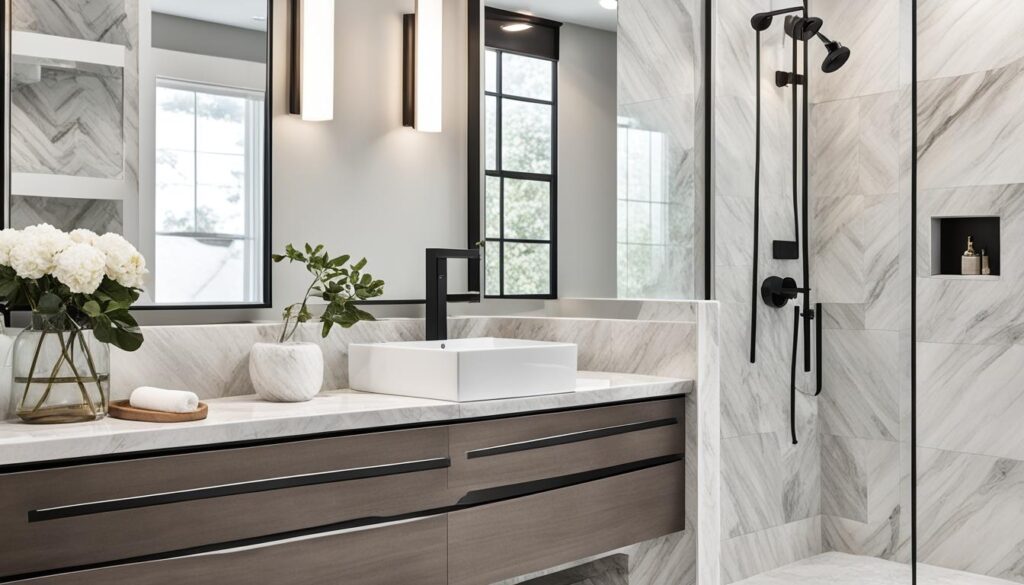
Color scheme: Painting or changing the color scheme for your bathroom can be a low-cost way to transform the space. Neutral colors are a popular choice, but bold accent walls or patterned tiles can add a dramatic touch. Remember, the more intricate the design, the higher the cost.
Storage solutions: Adequate storage can help keep your bathroom organized and clutter-free. Built-in options or floating shelves can add both functionality and style. Consider installing pull-out drawers or wire baskets for added convenience.
Remember, every design choice you make can impact the total cost of your small bathroom remodel. Weigh your options carefully, and don’t be afraid to get creative while staying within your budget.
Tips for Budget-Friendly Small Bathroom Remodels
Renovating a small bathroom can be costly, but with the right strategies, you can keep expenses under control. Here are our top tips for a budget-friendly small bathroom remodel:
Prioritize Essential Upgrades
Before you start your renovation, prioritize the essential upgrades that you need. This might include fixing leaks, replacing outdated fixtures, or updating old plumbing. By prioritizing necessary upgrades, you can avoid overspending on unnecessary expenses.
Find Cost-Effective Alternatives
Consider alternatives to expensive materials and fixtures. For example, opt for vinyl flooring instead of hardwood, choose a basic bathtub rather than a luxury spa tub, or use a standard showerhead instead of a rainfall showerhead. You can still achieve a stylish design with lower-priced options that don’t compromise on quality.
Repurpose Existing Fixtures and Materials
Repurposing items from your existing bathroom can help you save on costs. For instance, reusing the existing vanity or upgrading it with a fresh coat of paint and new hardware can be more affordable than buying a new one. You could also use leftover tiles from a previous project to create a backsplash or a decorative feature.
Consider DIY Projects
If you have some DIY skills, consider tackling some projects yourself, such as painting walls, installing tiles, or upgrading fixtures. However, avoid areas that require expert skills such as plumbing or electrical work, which could end up costing you more in the long run if mistakes are made.
By following these tips, you can achieve a stylish and functional small bathroom remodel at an affordable cost.
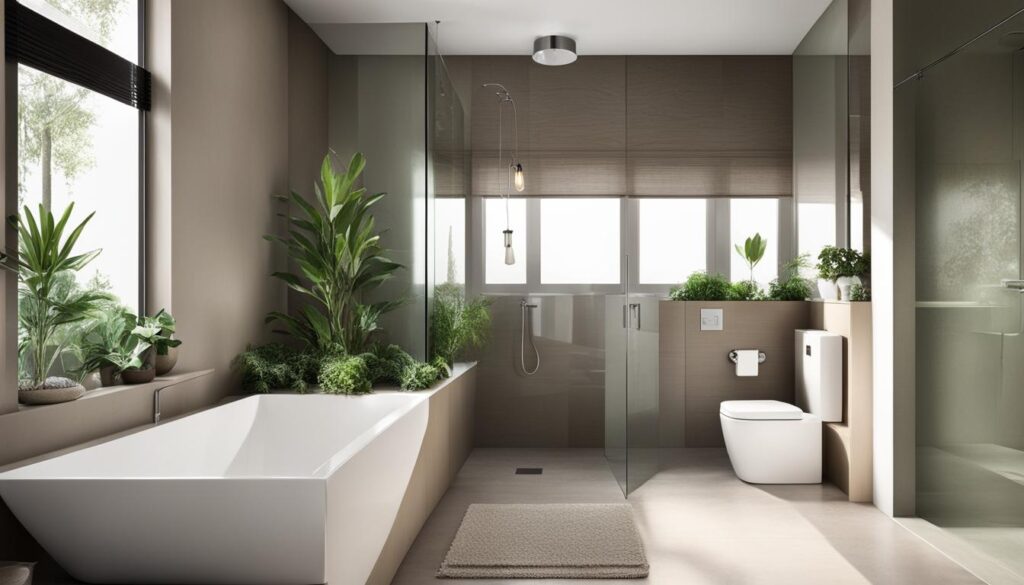
Hidden Costs and Unexpected Expenses
No matter how much you plan, small bathroom remodels can be unpredictable. Unexpected expenses may come up at any point, throwing off your budget. Some of the hidden costs that may arise during a remodel include structural problems, plumbing or electrical issues, and permit fees.
Structural problems can include anything from a leaky roof to a damaged subfloor. These types of issues need to be addressed before you begin renovating your bathroom. The cost of repairs can vary depending on the severity of the problem and the extent of the damage.
Plumbing and electrical problems can be costly to fix as well. If your existing plumbing or wiring is outdated, you may need to replace it entirely, driving up the cost of your bathroom remodel. It’s essential to address any potential issues during the planning phase, so you’re not caught off guard by the expenses later on.
Another hidden cost you need to account for is permit fees. Depending on where you live, you may need to obtain permits to complete your small bathroom remodel. This can include building permits and plumbing or electrical permits. Permit costs can add up quickly, so be sure to budget for them ahead of time.
To avoid unexpected expenses during your small bathroom remodel, it’s critical to have a contingency plan. Set aside extra funds in your budget for hidden costs and unexpected expenses, such as 10-20% of the total remodel cost. This will provide you with a financial cushion and flexibility to adjust the budget if needed.
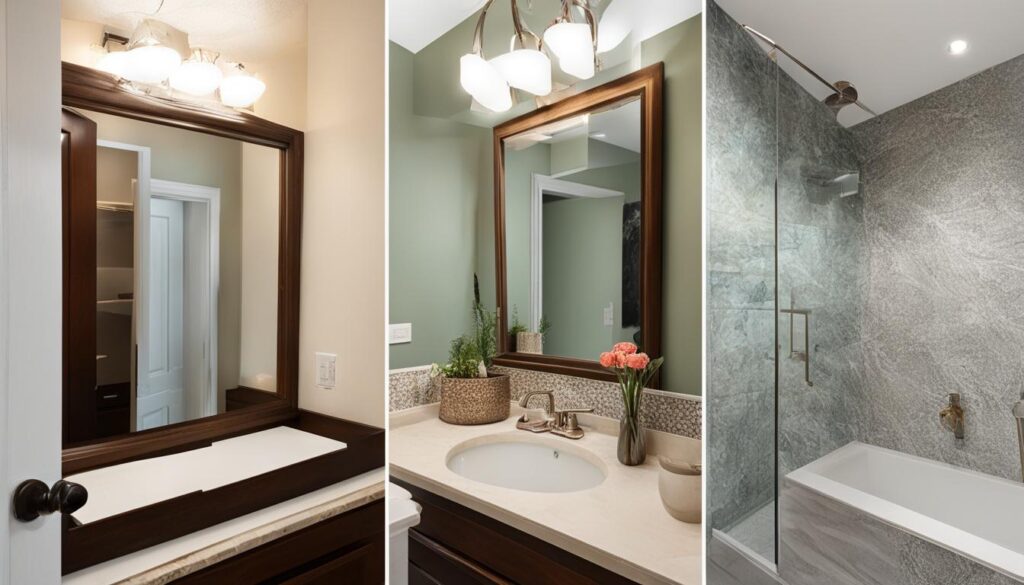
Summary:
- Structural problems, plumbing or electrical issues, and permit fees are some of the common hidden costs of small bathroom remodels.
- Permit costs can add up quickly, making it essential to budget for them ahead of time.
- Setting aside extra funds in your budget for unforeseen expenses can provide you with a financial cushion and flexibility.
DIY vs. Hiring Professionals for Small Bathroom Remodeling
Remodeling your small bathroom can be a daunting task, especially when it comes to deciding whether to take a DIY approach or hire professionals. Both options come with their pros and cons and can affect the overall cost and outcome of your project.
DIY remodeling generally allows you to save money on labor expenses and gives you full control over the design choices. However, work quality and skill level can influence results, leading to subpar workmanship or costly mistakes that can end up adding more expenses to your budget.
Hiring professionals means increased expenses, but also provides experience and skills necessary for a successful remodel. Professionals such as plumbers, electricians, and general contractors can get the job done faster and more efficiently, resulting in a higher-quality finished product.
If you decide to take the DIY route, make sure to plan thoroughly, research thoroughly, and know your limits. It’s also essential to follow local building codes and obtain permits as necessary.
On the other hand, if you opt to hire professionals, consider getting multiple estimates and researching potential hires thoroughly. This way, you can ensure you’re getting a fair price and work with experienced professionals you can rely on.
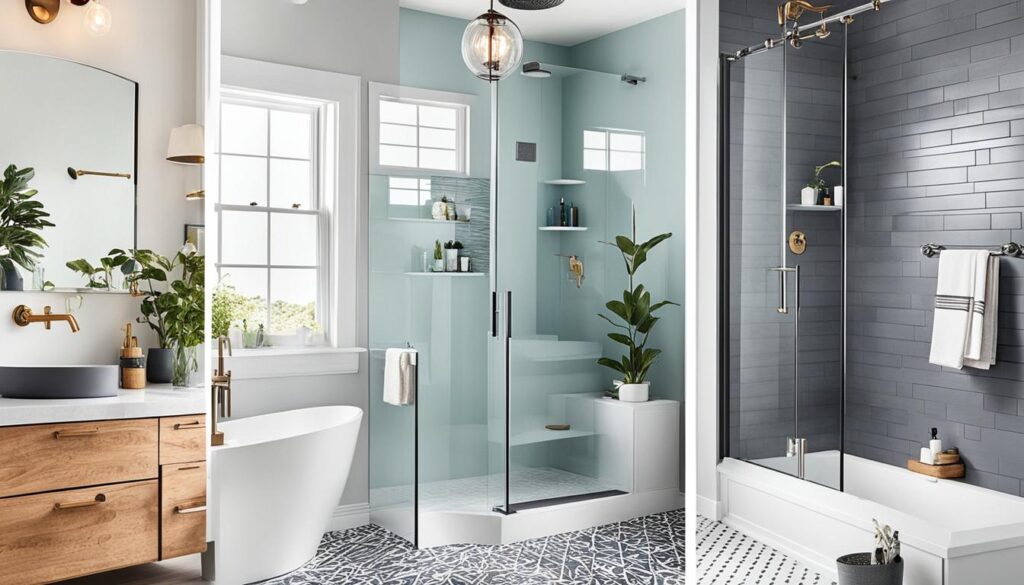
DIY vs. Professional Bathroom Remodeling Comparison
| Aspect | DIY | Professional |
|---|---|---|
| Cost | Lower material cost but potentially higher labor cost if mistakes are made | Higher material and labor costs, but professionals can work more efficiently |
| Time | Usually takes longer due to learning curve and potential mistakes | Faster due to professional experience and skills |
| Design | Full control over design choices | More design options and expert guidance on material choices |
| Quality | Quality can vary depending on DIY skills and experience | Professional, high-quality work |
Ultimately, the decision between DIY and hiring professionals for your small bathroom remodel comes down to your budget, DIY skills, and the complexity of your project. Consider the pros and cons of each approach and determine which option is best suited for your unique needs.
Financing Options for Small Bathroom Remodels
If you’re planning a small bathroom renovation, one of the major concerns is likely the cost. Fortunately, there are various financing options available to help homeowners update their bathroom without breaking the bank. Here, we will explore different financing options to help you evaluate the best solution for your specific project and budget.
Personal Loans
A personal loan is a popular option for financing a bathroom renovation. This type of loan is unsecured, meaning you don’t need to provide collateral such as your home or car. Instead, you receive a lump sum of money that you can use to complete the project. Personal loans typically have higher interest rates than secured loans, but they can provide faster access to funds and more flexibility in terms of payment plans.
Home Equity Loans
A home equity loan is a type of secured loan that uses your home as collateral. This loan allows you to borrow against the equity you’ve built in your home and use the funds for renovations. Home equity loans often have lower interest rates than personal loans, making them a cost-effective financing option for larger bathroom remodels. However, keep in mind that failure to repay the loan could result in the loss of your home.
Credit Cards
If you’re planning a small bathroom renovation, using a credit card could be a viable option. This financing method is convenient, as it allows you to complete the project quickly without having to apply for a loan. However, credit cards typically have higher interest rates than loans, so it’s important to pay off the balance as soon as possible to avoid accumulating debt.
Regardless of which financing option you choose, it’s important to evaluate your project’s estimated cost, timeline, and your current financial situation before making a decision. Take the time to research and compare lenders to find the best financing solution for your small bathroom remodel project.
By understanding how to finance your bathroom remodel, you can confidently move forward with your renovation project and achieve the bathroom of your dreams without sacrificing your budget.
FAQ
How much does it cost to remodel a small bathroom?
The cost of remodeling a small bathroom can vary depending on several factors, such as the size of the bathroom, the extent of the renovation, the materials used, and the location. However, on average, a small bathroom remodel can cost anywhere from ,000 to ,000.
What factors affect bathroom remodeling costs?
Several factors can influence bathroom remodeling costs, including the size of the bathroom, the desired upgrades and renovations, the complexity of the project, and regional differences. Additionally, the cost can be impacted by the choice of materials, fixtures, and labor expenses.
How do I estimate material costs for a small bathroom remodel?
To estimate material costs for a small bathroom remodel, consider the materials needed for fixtures (sink, toilet, shower/tub), tiles, countertops, flooring, and storage options. Research the prices of these items and determine the quantities required for your specific project to get an accurate cost estimate.
What are the labor costs associated with small bathroom remodeling?
Labor costs for small bathroom remodeling can vary depending on the complexity of the project and the region. Hiring professionals such as plumbers, electricians, carpenters, and general contractors can significantly impact the overall cost. It’s advisable to obtain quotes from multiple contractors to compare prices and services.
How do design choices impact bathroom remodel costs?
The design choices you make for your small bathroom can have a significant impact on the overall cost. Upgrading to high-end fixtures, using expensive tiles or materials, and incorporating intricate designs can increase expenses. On the other hand, opting for cost-effective fixtures, simple designs, and affordable materials can help keep the costs down.
What are some tips for budget-friendly small bathroom remodels?
If you’re looking to remodel a small bathroom on a budget, there are several tips you can follow. Prioritize essential upgrades, consider cost-effective alternatives for materials and fixtures, and explore DIY options for tasks that don’t require professional expertise. Additionally, shop around for the best prices and consider repurposing existing items to save money.
What are some hidden costs and unexpected expenses to watch out for during a small bathroom remodel?
While thorough planning can help minimize unexpected expenses, there are potential hidden costs to be aware of during a small bathroom remodel. These include structural issues that may require additional repairs, unforeseen plumbing or electrical problems, and permit fees required by your local municipality. It’s essential to budget for contingencies to avoid financial surprises.
Should I hire professionals or take a DIY approach for a small bathroom remodeling?
Whether to hire professionals or take a DIY approach for a small bathroom remodel depends on your skills, experience, and budget. While DIY can save you money, it’s important to assess your capabilities realistically. Certain tasks, such as plumbing or electrical work, may require professional expertise. Consider your comfort level, time availability, and the complexity of the project before making a decision.
What are some financing options for small bathroom remodels?
Financing options for small bathroom remodels include personal loans, home equity loans, and credit cards. Personal loans can provide a lump sum for the project, while home equity loans allow you to borrow against the value of your home. Credit cards can be used for smaller renovations. Evaluate your financial situation and compare interest rates and terms to determine the best financing option for your needs.






